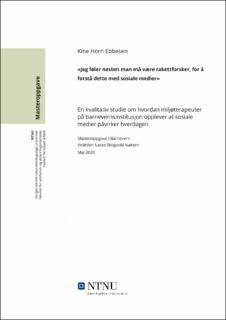| dc.contributor.advisor | Isaksen, Lasse Skogvold | |
| dc.contributor.author | Ebbesen, Kine Horn | |
| dc.date.accessioned | 2021-09-28T18:45:47Z | |
| dc.date.available | 2021-09-28T18:45:47Z | |
| dc.date.issued | 2020 | |
| dc.identifier | no.ntnu:inspera:55469675:28135274 | |
| dc.identifier.uri | https://hdl.handle.net/11250/2785682 | |
| dc.description.abstract | Sosiale medier har de senere år utviklet seg, og blitt en stor del av manges hverdag. Dette vil trolig også gjelde for hverdagen på en barnevernsinstitusjon. Bakgrunnen for denne studien, er fremveksten av sosiale medier. Utviklingen har hatt et tempo som ingen av oss har hatt mulighet til å følge, og det er derfor et interessant tema for forskning
Formålet med studien er å utforske hvilke konsekvenser bruk av sosiale medier kan ha for hverdagen på en barnevernsinstitusjon. Hensikten er også å bidra til økt fokus, kunnskap og informasjon omkring temaet. Studien tar utgangspunkt i kvalitativ metode, med semi- strukturerte dybdeintervju med ni individuelle informanter – som presenterer tre ulike barnevernsinstitusjoner. Disse informantene var alle miljøterapeuter, ved sine institusjoner.
Funnene viser at sosiale medier, i stor grad, påvirker hverdagen på en barnevernsinstitusjon. Ungdommenes bruk går på bekostning av det miljøterapeutiske arbeidet, blant annet ved at ungdommen oppleves utilgjengelig. Sosiale medier gir også muligheter for ungdommen til å ha ubegrenset kontakt med sin biologiske familie, dette kan være både positivt og negativt. Denne kontakten kan, i noen tilfeller, være stabiliserende for ungdommen. Dersom kontakten ikke er av positiv art, er foreldresamarbeid nevnt som den mest reelle løsningen. Sosiale medier gir også ungdommen mulighet til å leve to ulike liv, blant annet ved at det de legger ut på sosiale medier – ikke stemmer overens med det miljøterapeuten ser. Sosiale medier, er i stor grad, preget av en vellykkethet. Dette kan føre til et psykisk press på ungdommene, ved at de sammenligner seg selv med det som legges ut av andre – både jevnaldrende og influencere.
Videre tyder funnene på at økt kunnskap omkring temaet er nyttig i fremtiden. Institusjonene mangler rutiner på hvordan de skal håndtere bruken av sosiale medier, og dette fører til at det blir litt tilfeldig hver gang. Dette skaper usikkerhet, både for de ansatte og ungdommene. Dette vil også kunne være til hinder for det miljøterapeutiske arbeidet.
Nøkkelord: Miljøterapi, barnevernsinstitusjon, sosiale medier | |
| dc.description.abstract | For the last few years, social media has developed quickly and become a part of people ́s everyday life – which will likely, eventually, also be said for child welfare institutions. The background of this study is the growing presence of social media, a rapid growth none of us have been able to stay up-to-date with – and therefore an interesting subject to research further.
The purpose of this study is to explore the consequences a daily use of social media can have at child welfare institutions. The intention is also to contribute to awareness, a higher focus, and education around the topic. For this study, a qualitative method is being used, with semi- structured in-dept interviews with nine individuals informers, who are representing three different child welfare institutions. The informants all work as milieu therapists at their institutions.
The study shows that, social media – to a large extent – i affecting the everyday lives of the people at the institutions. The youths use of the plattforms are at the expense of the therapy offered – since they are seemingly occupied. Social media is also a way for the youths to stay in touch with their biological families at all times – which can be both positive and negative. To some degree, this contact can help them feel more at ease and stabilized. If the conversations are not positive, is a cooperation with the parents said to be the best solution. Social media also allows living two separate lives – especially if what ́s being posted is not according to what the therapist sees to be true. Social media is – to a large extent – a place where you have to seem «successful». This can lead to a mental pressure for the youths, where they are comparing themselves to what the see is being postes by people their age and influencers.
The study also finds that further education around the topic is important for the future. For now, the institutions are lacking routines on how to deal with the use of social media – which leads to a «fail and try» routine each time. This creates insecurities – both for the employees and the youths at the institution – which can be on obstacle for the theraputic work that ́s being done.
Keywords: Milieu therapy, child welfare institution, social media | |
| dc.language | nob | |
| dc.publisher | NTNU | |
| dc.title | "Jeg føler nesten man må være rakettforsker, for å forstå dette med sosiale medier"
En kvalitativ studie om hvordan miljøterapeuter på barnevernsinstitusjon opplever at sosiale medier påvirker hverdagen | |
| dc.type | Master thesis | |
